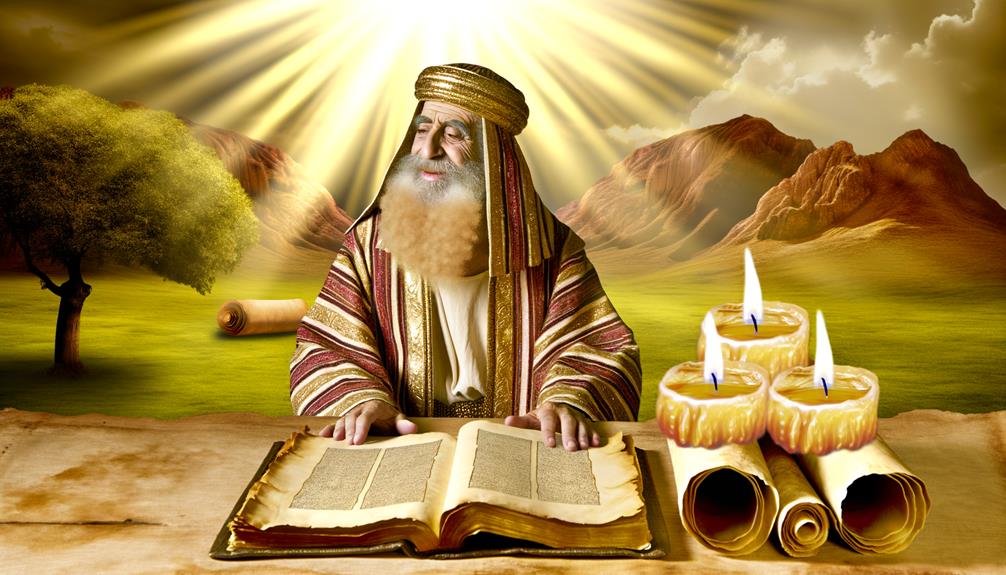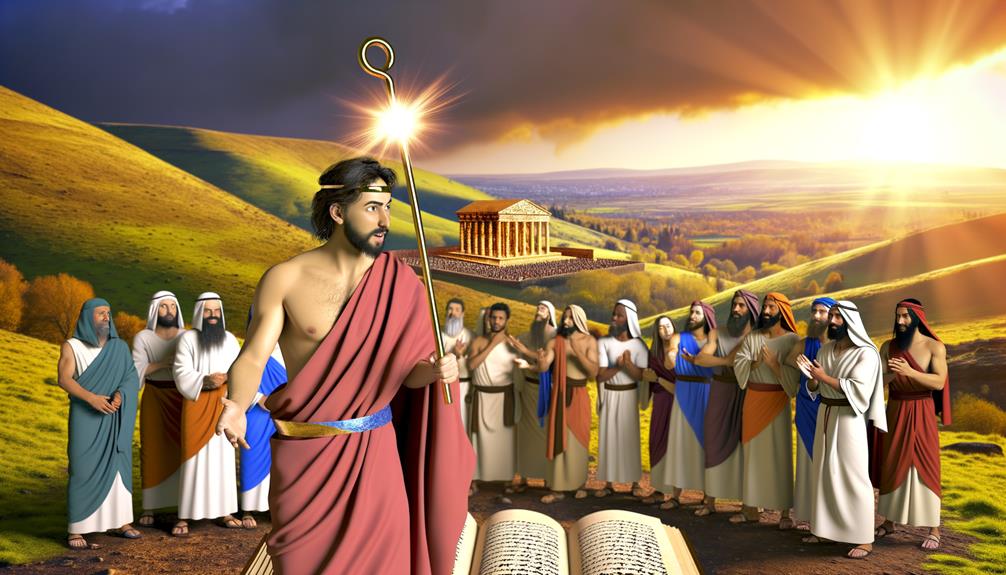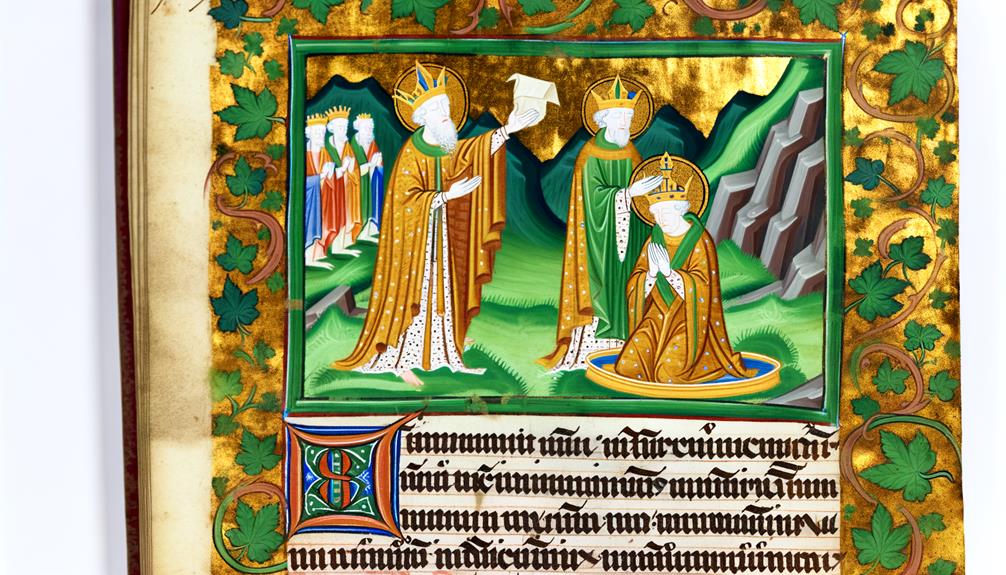Meaning of Samuel in the Bible Verse: God’s Listener
In biblical scripture, the name Samuel, derived from the Hebrew ‘Shemuel,’ means ‘heard by God,’ signifying divine responsiveness to human requests. This is exemplified in Hannah’s prayer for a child, as narrated in 1 Samuel 1:20, where her plea is answered with Samuel’s birth.
His dedication to the Lord and early service in the temple under Eli emphasize themes of divine intervention and purpose. Samuel’s role expands from prophetic duties to pivotal moments in Israel’s change to monarchy.
Through unwavering obedience and divine calling, Samuel’s life bridges spiritual and political domains, providing profound insights into divine governance and leadership principles.

Meaning of Samuel in the Bible: Biblical Significance and Spiritual Insights
| Aspect | Details |
|---|---|
| Name Origin | Hebrew origin, meaning “God has heard” or “name of God.” |
| Biblical Reference | Samuel was a prophet and the last judge of Israel, playing a pivotal role in anointing the first kings of Israel (1 Samuel). |
| Spiritual Significance | Symbolizes divine purpose, answered prayers, and a connection to God’s will. |
| Life Lessons | Demonstrates obedience, faith, and the power of listening to God’s voice. |
| Cultural Relevance | Revered as a prophet, leader, and bridge between judges and the monarchy. |
| Common Themes | Faithfulness, divine guidance, and prophetic insight. |
| Positive Attributes | Reflects wisdom, humility, and steadfast dedication to God. |
Origin of the Name Samuel

The name Samuel originates from the Hebrew name ‘Shemuel,’ which means ‘heard by God‘ or ‘name of God.’ This etymology reflects significant theological implications, emphasizing divine communication and covenantal relationships in ancient Israel.
Historically, names held profound meanings, often signifying an individual’s destiny or divine purpose. In the scriptural context, the name Samuel is emblematic of God’s responsive nature to human pleas, as seen in the biblical narrative where God hears and answers Hannah’s fervent prayers.
The name encapsulates a dual acknowledgment—God’s sovereignty and intimate involvement with His people. By understanding the origin of Samuel, one gains deeper insight into the cultural and spiritual milieu of the biblical era, revealing the profound connection between names and divine interaction. This connection is further highlighted through various biblical narratives, where names often reflect significant events or divine interactions. For instance, the meaning of the book of Joel centers on themes of restoration and repentance, emphasizing God’s willingness to intervene in the lives of His people. By examining these narratives, one can appreciate the layers of meaning embedded in the scriptures, fostering a deeper understanding of both the historical context and the theological implications of biblical names.
Samuel’s Birth and Dedication

Hannah’s heartfelt supplication and subsequent vow to dedicate her son to the Lord set the stage for Samuel’s extraordinary birth and consecration. In her distress, Hannah prayed earnestly at the temple, promising that if granted a son, she would dedicate him as a Nazirite. Her prayers were answered, and she bore Samuel, meaning “heard of God” (1 Samuel 1:20). True to her vow, Hannah brought Samuel to the temple after he was weaned, entrusting him to Eli, the High Priest.
| Event | Scriptural Reference | Significance |
|---|---|---|
| Hannah’s Prayer | 1 Samuel 1:10-11 | Vow to dedicate Samuel |
| Samuel’s Birth | 1 Samuel 1:20 | Name reflects divine hearing |
| Dedication to the Lord | 1 Samuel 1:24-28 | Fulfillment of Hannah’s vow |
| Service in the Temple | 1 Samuel 2:11 | Beginning of Samuel’s service |
Samuel as a Young Prophet

Emerging as a young prophet, Samuel received his initial divine call during a time of widespread spiritual apathy in Israel. His early years were marked by his service under Eli, the high priest, at the Shiloh sanctuary (1 Samuel 3:1).
The biblical narrative underscores a period of rare divine communication, heightening the significance of Samuel’s prophetic emergence. His youthfulness juxtaposed with his profound spiritual experiences signals a divinely orchestrated renewal.
Theologically, Samuel’s early prophetic role signifies God’s intervention in a declining spiritual landscape. Historically, it marks a pivotal change from the era of judges to the establishment of the monarchy.
Scripturally, Samuel’s formative years exemplify divine election and preparation, setting the stage for his future pivotal contributions to Israel.
Samuel and God’s Calling

Samuel’s early life, marked by his dedication to God’s service under Eli’s mentorship, set the stage for his unique role as a prophet.
His recognition of the divine voice, a pivotal moment recorded in 1 Samuel 3, underscores the importance of spiritual discernment and responsiveness.
Samuel’s unwavering obedience to God exemplifies his commitment to divine commands, shaping his prophetic ministry and Israel’s history.
Samuel’s Early Life
From a young age, Samuel experienced a profound and divinely orchestrated calling that would set the course for his influential role in the history of Israel.
Born to Hannah, whose fervent prayers for a child are recorded in 1 Samuel 1, Samuel was dedicated to the Lord’s service by his grateful mother.
Raised in the temple under the priest Eli’s guidance, Samuel’s early life was steeped in spiritual instruction and temple duties. This nurturing environment prepared him for his unique prophetic mission.
According to 1 Samuel 3, Samuel’s calling was not a mere human decision but a divine initiative, highlighting his role as a pivotal figure in Israelite history, bridging the era of the judges and the monarchy.
Divine Voice Recognition
In the stillness of the night, the young Samuel heard a voice calling his name, not realizing initially that it was the Lord speaking directly to him, as recorded in 1 Samuel 3:4-10. This pivotal moment illustrates the concept of ‘Divine Voice Recognition,’ a significant theme in biblical theology. Historically, this event marks the shift from priestly to prophetic leadership in Israel.
- Revelation: God’s calling signifies a divine revelation uniquely directed at Samuel, affirming his future role as a prophet.
- Misinterpretation: Initially, Samuel misinterprets the voice, seeking guidance from Eli, highlighting the human struggle in discerning divine messages.
- Recognition: With Eli’s counsel, Samuel learns to recognize and respond to God’s call, emphasizing the importance of spiritual mentorship and readiness to listen.
Obedience to God
Through his immediate and unwavering response to God’s call, Samuel exemplifies the profound biblical principle of obedience to divine authority. This obedience is rooted in a deep, scriptural understanding of God’s sovereignty and the historical context of Israelite leadership.
| Aspect | Significance |
|---|---|
| Immediate Response | Samuel’s quick answer highlights prompt obedience. |
| Divine Authority | Recognizes God’s supreme rule over human affairs. |
| Historical Context | Samuel’s role in Israel’s shift from judges to monarchy. |
| Scriptural Foundation | Aligns with Deuteronomy’s emphasis on heeding God’s voice. |
| Prophetic Role | Samuel’s obedience establishes him as a key prophet. |
Samuel’s life illustrates that true obedience involves not just hearing but acting upon God’s word, setting a precedent for future prophetic ministry.
Anointing of King Saul

The anointing of King Saul marks a pivotal moment in Israelite history, characterized by Samuel’s divine mission to establish monarchy in response to the people’s demand for a king.
Rooted in 1 Samuel 9-10, the narrative reveals the complexities of choosing Israel’s first king, where Saul’s physical stature and divine selection underscore God’s sovereignty despite human inclinations.
The anointing ceremony, rich in symbolic actions and prophetic significance, underscores the theological shift from theocratic judgeship to monarchical rule.
Samuel’s Divine Mission
Commissioned by God, Samuel’s pivotal role in anointing Saul as the first king of Israel marked a transformative moment in the nation’s monarchical history. This divine mission underscored several key aspects:
- Divine Selection: Samuel’s anointing of Saul was not a human decision but a divine mandate, as seen in 1 Samuel 9:16-17, where God instructs Samuel to anoint Saul.
- Prophetic Authority: Samuel’s role emphasized the intersection of prophetic authority and kingship, highlighting his critical function as God’s mouthpiece.
- Covenantal Continuity: The act of anointing Saul bridged the period of the judges to the establishment of the monarchy, ensuring the continuity of God’s covenant with Israel.
Samuel’s divine mission therefore encapsulated a divine directive, prophetic endorsement, and covenantal change.
Choosing Israel’s First King
Anointing Saul as Israel’s first king marked a significant moment of divine intervention and leadership change, deeply rooted in God’s covenantal promises and prophetic guidance. As the Israelites clamored for a monarch to unite and lead them like other nations, God directed Samuel to select Saul, a Benjamite, highlighting divine sovereignty in human governance. Scripturally, this moment is pivotal, as it shifts Israel from a confederation of tribes under judges to a centralized monarchy. Theological analysis underscores the balance between human agency and divine will, as seen in 1 Samuel 9-10, where Saul’s anointing symbolizes God’s continued involvement in Israel’s destiny.
| Aspect | Details |
|---|---|
| Divine Selection | God chose Saul through Samuel |
| Human Request | Israelites desired a king |
| Theological Significance | Shift to monarchy |
Saul’s Anointing Ceremony
Following God’s directive, Samuel meticulously followed the divine instructions to anoint Saul, an event rich with symbolic and theological significance as described in 1 Samuel 10. This ceremony marked the divine legitimization of Saul’s kingship and the establishment of Israel’s monarchy.
Key elements include:
- The Anointing Oil: Symbolizing the Holy Spirit’s empowerment, the oil poured on Saul’s head indicated divine selection and blessing.
- Prophetic Signs: Samuel provided Saul with specific signs, affirming God’s active involvement and foreknowledge, thereby bolstering Saul’s faith.
- Public Acclamation: The gathered assembly’s acknowledgment of Saul as king underscored communal acceptance and unity under divine ordinance.
This act of anointing intertwined divine authority with Israel’s political structure, reflecting a theocratic foundation for their monarchy.
Samuel’s Role in David’s Rise

As a pivotal figure in the narrative of Israel’s monarchy, Samuel’s divinely guided actions were instrumental in the anointing and rise of David, establishing a new chapter in the nation’s history.
Guided by God’s command, Samuel journeyed to Bethlehem, where he identified and anointed David, the youngest son of Jesse, as the future king (1 Samuel 16:1-13). This act signified a divine shift from the faltering reign of Saul to the advent of David’s leadership.
Samuel’s discernment and obedience to God’s will underscored his essential role in legitimating David’s kingship. This pivotal moment not only altered the political landscape of Israel but also laid the foundation for the Davidic covenant, which would have lasting theological significance.
Samuel’s Leadership in Israel

Samuel’s leadership in Israel was marked by his dual role as both prophet and judge, providing spiritual guidance and judicial oversight during a critical period of change for the nation. His impact can be examined through three primary aspects:
- Religious Reform: Samuel called Israel back to covenant faithfulness, emphasizing the worship of Yahweh alone (1 Samuel 7:3-4).
- Judicial Authority: As a judge, he traveled to various cities, administering justice and guaranteeing adherence to divine law (1 Samuel 7:15-17).
- Shift to Monarchy: Samuel anointed Saul and later David, guiding Israel through the shift from tribal confederation to monarchy (1 Samuel 10:1, 16:13).
Through these roles, Samuel guaranteed a stable foundation for Israel’s spiritual and political future.
Samuel’s Legacy and Influence

The profound impact of Samuel’s leadership is further reflected in his enduring legacy and influence on Israel’s religious and political evolution.
Samuel’s anointment of Saul and later David as kings marked the shift from the era of judges to the monarchy, greatly altering Israel’s governance structure. His unwavering dedication to Yahweh and his role as a prophet established a model of spiritual integrity and divine obedience.
Scripturally, Samuel is revered for his intercessory prayers and his essential role in guiding Israel through turbulent times (1 Samuel 7:9-10).
Historically, Samuel’s influence bridged the gap between tribal confederation and centralized monarchy, underscoring his vital role in shaping the theological and socio-political landscape of ancient Israel.
Samuel in Religious Contexts

Samuel’s prophetic role stands as a cornerstone in Israelite history, bridging the era of the judges and the establishment of the monarchy.
His spiritual leadership, marked by unwavering devotion to God, set a precedent for future prophets and leaders.
In addition, his anointing of Saul and David underscores the theological significance of divine authority in the selection and legitimization of kings.
Samuel’s Prophetic Role
Renowned for his pivotal role in the change from the period of judges to the establishment of monarchy in ancient Israel, the prophetic ministry of Samuel is deeply embedded in the theological and historical narrative of the Bible.
Samuel’s contributions are multifaceted:
- Divine Communication: Samuel was the conduit for God’s messages, guiding Israel through divine revelations (1 Samuel 3:19-21).
- National Leadership: He anointed the first two kings of Israel, Saul and David, marking the change to a unified monarchy (1 Samuel 10:1; 16:13).
- Judicial Authority: As the last judge of Israel, Samuel administered justice, symbolizing the close of an era (1 Samuel 7:15-17).
His prophetic role underscores the profound intersection of divine direction and national destiny.
Spiritual Leadership Legacy
Illuminating the path for future generations, Samuel’s spiritual leadership bequeathed a profound legacy that continues to resonate in religious contexts. His unwavering faith and moral integrity are exemplified in his roles as prophet, judge, and priest.
Historically, Samuel’s leadership bridged the turbulent era of the Judges and the establishment of the monarchy, offering stability and divine guidance.
Scripturally, his life encapsulates divine calling and obedience, as seen in 1 Samuel 3:10, where he responds to God’s call with, ‘Speak, for your servant is listening.’
Samuel’s spiritual legacy is rooted in his dedication to God’s will, influencing subsequent generations of religious leaders and establishing a paradigm of devout service and righteous governance.
Anointing Kings’ Significance
Building on his spiritual leadership, Samuel’s role in anointing Israel’s first kings holds profound theological and historical significance. This pivotal act established the monarchy, shaping the nation’s future. Samuel’s anointing of Saul and later David marked a divine endorsement, linking kingship with religious authority.
Key aspects include:
- Divine Selection: God’s choice, communicated through Samuel, underscored the theocratic nature of Israel’s kingship, emphasizing divine will over popular choice.
- Covenantal Continuity: The anointing rituals reinforced the covenantal relationship between God and Israel, ensuring the king’s role as God’s representative.
- Prophetic Authority: Samuel’s involvement highlighted the prophet’s essential role in guiding and legitimizing political authority, bridging divine command and human governance.
This confluence of spiritual and temporal power was transformative for Israel’s identity.
Lessons From Samuel’s Life

Examining the life of Samuel through a theological lens reveals profound lessons about faith, leadership, and obedience to God’s will. Samuel, dedicated to God before birth, exemplifies unwavering faith through his childhood service in the temple and his response to God’s call. His leadership is marked by integrity, guiding Israel with wisdom during tumultuous times. Samuel’s life also underscores the importance of obedience; his refusal to compromise God’s commands, even when confronting King Saul, highlights his steadfast devotion.
| Aspect | Example from Samuel’s Life | Key Lesson |
|---|---|---|
| Faith | Service in the temple | Unwavering trust in God |
| Leadership | Guiding Israel | Integrity and wisdom |
| Obedience | Confronting King Saul | Steadfast devotion to God |
These lessons resonate deeply, offering timeless insights for contemporary believers.
Conclusion
In the grand tapestry of biblical narrative, Samuel emerges not merely as a prophet but as a divine multitasker—midwife to kings, spiritual disciplinarian, and celestial errand boy.
His life underscores the irony of human ambition juxtaposed with divine will, offering a cautionary tale for those who dare to negotiate with the divine.
In Samuel, scripture provides a masterclass in the art of divine puppetry, reminding the devout of the ever-elusive, omnipotent puppeteer.






